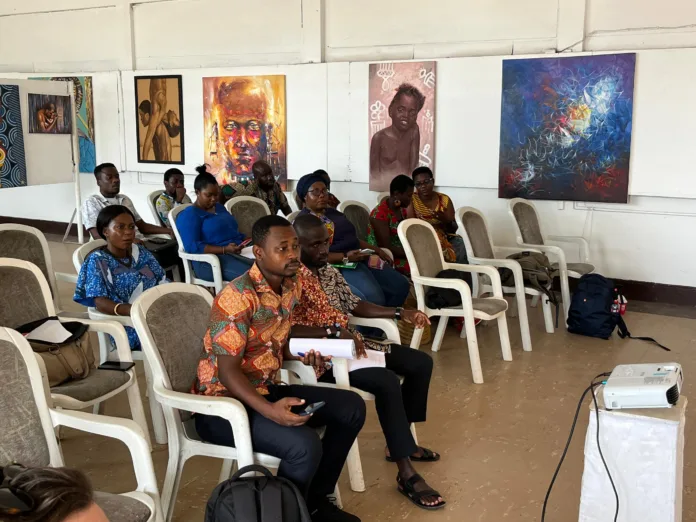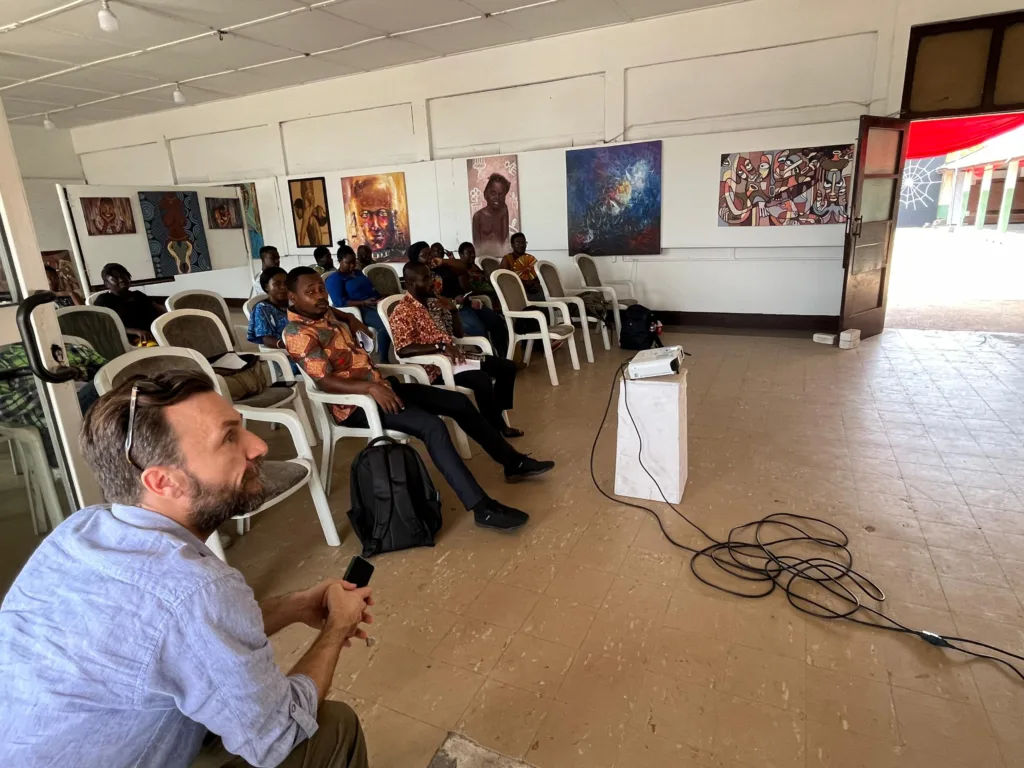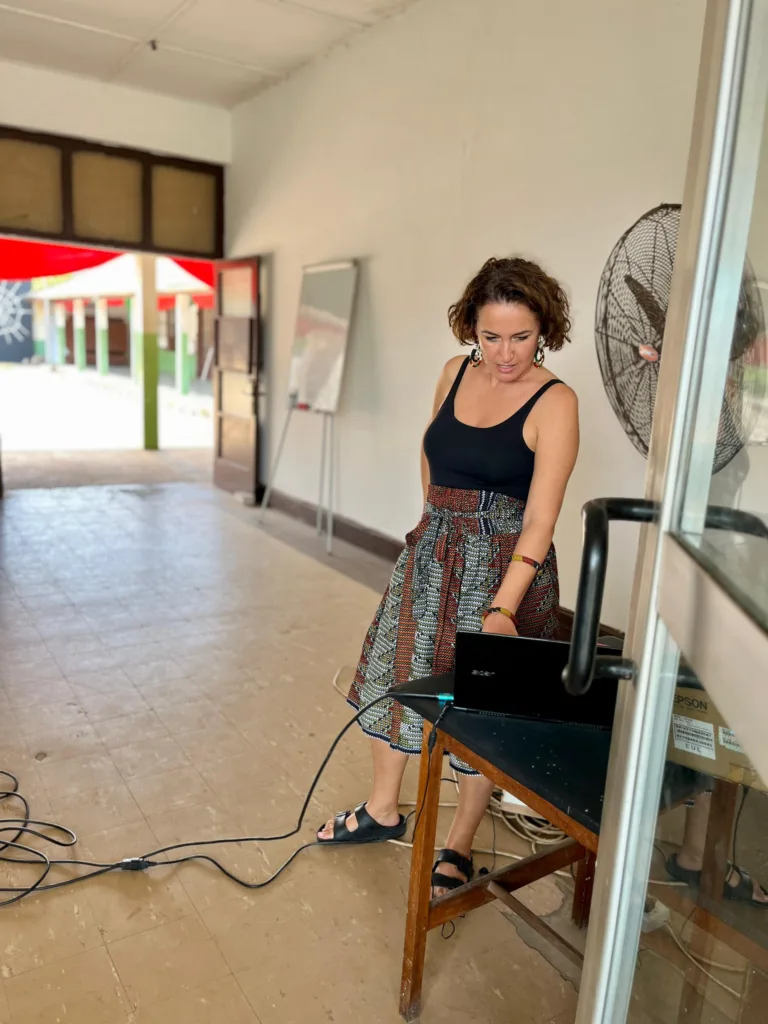
International cultural outfit, the Heritage Management Organziation has organized trainings for Ghanaian heritage caretakers, practitioners, archealogists, educators relating to heritage matter and communities in community engagement, etc as regards heritage prservation.
Pariticpants numbering over fifty (50) were tutored on various aspects of heritage management especially techniques to efficiently engage communities in cultural heritage. They consist of individuals that work with the National Commission on Culture, NGOs and community representatives.
Two trainings have been put together at the Arts Center in Accra and in Wiinneba between December 5 & 17 2023, in partnership with the National Commission on Culture and the Center for National Culture.
Project Manager for Ghana Programs at the Heritage Management Organization and lead trainer Dr. Eleni Stefanou, revelead that her outfit organizes trainings in Greece and African countries including the Gambia, Ethiopia, Rwanda, amongst others. Trainings in Africa are sponsored by US-based Melon Foundation.
Outcomes (Cultural Differences and Similarities)
Speaking to starrf.com.gh, Eleni intimated that even though she comes from a different cultural context, some cultural aspects are not so different.

She said “it’s interesting because we come from a diferent context but we realised that in some aspects, the contexts are not so different. So we try to teach on collaborative and interactive basis. We might be talking about methodologies or practices and how we work but we insist on the fact that the people we work with are also experts and are bearers of the local knowledge we dont have.”
On similarities, she noted that “when people are talking about daily life in the periphery and how family life is structured, all these we do have in Greece as well, except some of these practices are dying out because of industrialization and people having to move to the cities for the past 30 years. But the generation before that lived with parents and grandparents etc., so there are very smimilar practices and this brings us close to one another.”
As regards differences in cultural management, she sighted a typical scenario “usually, we say that when we take an oral history interview, we want to informant, either man or woman to be somehwere in a quiet environment with us and be alone because otherwise, the husband or wife can intervene, if they have chickens around, there’s noise and you can’t record the voice if you’re out in the open. So, last year when I was in the Gambia, I was explaining how technically a correct interview should be and I was told that cannot happen in the Gambia because a woman informant shall never be alone in her home with a male interviewer which I had never thought about and they were right. So, there you have to come up with solutions that are culturaly relevant and ethically relevant to the people you’re talking with.”
Oral History
Even though many Ghanaians are of the opinion that the country’s oral history is gradually fading out. Lena believes it is rather being preserved but in a different form.
She explained “here in africa, at least for the Gambia and Ghana, you have so rich oral tradition that sort of goes through all levels of life. Female practices, practices of manhood, religious practices, symbols, dance, etc. Here, I don’t think its dying out. It’s another aspect if were talking about recording it or documenting it and keeping it in official archives and another matter of how present it is in the people’s lives and practices daily. “
“I think it’s very vibrant and present. In Greece, its more recorded than existing, except you’re in small parts with elderly people. Even the younger generation beow 40 have lost it.”

Heritage Preservation
When asked if Ghana was doing excellent in preserving its heritage sites, she insisted that based on her experience in Ghana, she had come across many programs that prove that the right things are being done, though she could not speak to funding, etc.
She said “In Ghana, we have a mapping exercise where we send out forms for people who work in culture to fill in and we see where they’re coming from, and which projects and instiuuttions they represent and their needs in training.”
“So, I’ve seen many projects in Ghana related to cultural heritage. It doesnt mean they have to be related to emonuments, like the big narratives like a castle. They have all sorts of projects related to music, language, weaving, historical personalities, practices like traditional fishing. So, I will say from what I’ve seen so far. In Ghana, from what I’ve seen so far, there is very good work that is being done.”
She added “I can’t speak to funding, etc but I see very interesting things throughtout the coutnry. I also see a very good knowledge of what our participants are managing and what they want to achieve through it.”
Participants
On the sidelines of one training session in Accra, starfm.com.gh spoke to a participant Hillary Adongo, founder of the Restorative Seed Society who shared his insights on the initiative.
He said “this training is for people within the cultural space and managing our cultural heritage is as important as getting the value that we would need from our culture and modern practices on how we can ensure that while we are managing, we are not destroying the essence. There are for instance things your are doing, thinking you’re preserving but erasing the history.”
“If we want to ensure that our community heritage sites are sustained, then we must know how to engage the communities and that is the very essence of this training.”
As regards funding and publicity of Ghana’s heritage sites, Mr Adongo intimated “I think that on both sides, we are not doing so well as a country in terms of funding. This is a very iconic facility (Arts Center) where we are but we can see from observation that this is not a place that is well resourced. As we go around the whole country, the organiations that are supposed to be working on our culture are not well resourced.”
“The other thing is that the little that we are also doing, we are not promoting it enough among the local populace. There are people who live in accra and have never traveled to Kumasi or Tamale. But if we are able to do a lot of the local promotion, we will go very far. Our focus has always been outside and we saw what Covid did to us. We were left here and no one could come in. So if we are able to promote local tourism within not just by going on social media but how do we get to the schools and communities to understand that we can patronise our own and that’s one of the things I also feel we’re not doing well.”
He added “the sense of this training is key in that, we need to ensure that organizations like the Heritage Organization have the opportunity to train some of these people who handle our cultural heritage because there are simpe things that we do, that we dont know that we are actually destroying the heritage, I think this just underscores the importance of training the managers of our heritage sites.”
Center for National Culture
Acting Regional Director, Center for National Culture Eric Ohene Larbi highlighted the importance of this training, saying “in every institution, the human resource management is paramount and having your staff at the institution, you need also to build their capacities in order for them to deliver more efficiently and effectively. You can only do that by organizing such training workshops to equip them in the area of their skills and ability to deliver.”
“The areas of which the facilitators are taking them through is highly important as far as our instuttion is concerned. We being the adminsitrators for our culture and heritage, it is obliged to us to have in-depth jknowledge on how to promote, preserve and present it to others to accept.”
He went on “for that matter, we being the custodiuans and the administrators of it, we need to equip ourselves more. It’s not that we don’t know but we’re trying to add more. We’re taking them through the community engagements and and how we can preserve, promote and sell cur cultural heritage in our various communities. We will also add more knowledge and skills in the lives of our administrators.”
Source: Ghana/Starrfm.com.gh/103.5FM


